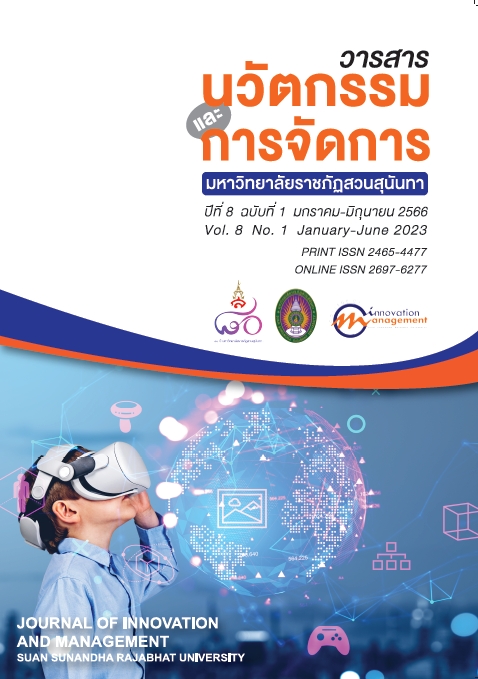Management Model of Demonstration School, Rajabhat University, Rattanakosin Group to Excellence
Keywords:
Management, Demonstration School of Rajabhat University, ExcellenceAbstract
The research aimed to (1) investigate nine management elements of a demonstration school, Rajabhat University, Rattanakosin group to excellence, which included spiritual leadership, strategic planning, focus on students and stakeholders, focus on teachers and staff, process management, knowledge management, result, resource, participation, and society and (2) examine the level of management elements to excellence. The research sample group included 560 respondents drawn from the executive management team, teachers and staff, and student parents for the academic year 2022 by using a simple random sampling technique. The data was gathered through a questionnaire with Cronbach's Alpha Coefficient of 0.99 and analyzed using Second Order Confirmatory Factor analysis, mean and standard deviation. The study discovered that (1) management elements of a demonstration school to excellence consisted of nine elements, weighted between .90-.99, descended from the result, knowledge management, and focus on students and stakeholders, respectively. Furthermore, the demonstration schools management model to excellence was consistent with the empirical data (c2= 224.684, df = 208, P-value = .203, c2/df = 1.08, GFI = .973, AGFI = .947, CFI = .999, SRMR =.007, RMSEA =.012), and (2) all nine management elements of the demonstration school to excellence were at the highest level, with a mean score of 4.23-4.39, a standard deviation of .67-.72.
References
Aladwan, S. A., and Forrester, P. (2016). The leadership criterion: challenges in pursuing excellence in the Jordanian public sector. The TQM Journal, 28(2), 295-316.
Alauddin, N. and Yamada, S. (2022). TQM model based on Deming prize for schools. International Journal of Quality and Service Sciences, 14(4), 635-651.
Ali, M., Usman, M., Shafique, I., Garavan, T. and Muavia, M. (2022). Fueling the spirit of care to surmount hazing: foregrounding the role of spiritual leadership in inhibiting hazing in the hospitality context. International Journal of Contemporary Hospitality Management, 34(10), 3910-3928.
Asad, M. M., Rind, A. A., and Abdulmuhsin, A. A. (2021). Impact of transformational leadership on educational institutes culture: a quantitative study in the context of Pakistan. International Journal of Organizational Analysis, 30(5), 1235-1250.
Bush, T., Abdul Hamid, S., Ng, A., and Kaparou, M. (2018). School leadership theories and the Malaysia education blueprint: Findings from a systematic literature review. International Journal of Educational Management, 32(7), 1245-1265.
De Menezes, L. M., Escrig-Tena, A. B., and Bou-Llusar, J. C. (2022). Sustainability and Quality Management: has EFQM fostered a Sustainability Orientation that delivers to stakeholders?. International Journal of Operations & Production Management, 42(13), 155-184.
Hair, J.F., Black, W.C., Babin, B.J. and Anderson, R.E. (2010). Multivariate Data Analysis. 7th ed. Pearson: New York.
Institute for the Promotion of Teaching Science and Technology. (2021). PISA 2018 Reading, Mathematics and Science Assessment Results. Bangkok: Institute for the Promotion of Teaching Science and Technology. (in Thai)
KA, Z., and Aboobaker, N. (2021). Spiritual leadership and intention to stay: examining the mediating role of employee voice behaviour. Journal of Management Development, 40(5), 352-364.
McKay, F. (2022). Higher Education Professional Services Staff as Regulatory Policy Actors: an English Case Study. In Governance and Management in Higher Education, 43, 71-88.
Moral Santaella, C. (2022). Successful school leadership for social justice in Spain. Journal of Educational Administration, 60(1), 72-85.
National Institute of Educational Testing Service. (2022). Examination arrangements. [Online]. Retrieved July 19, 2022, from: https://www.niets.or.th/th/. (in Thai)
National Institute of Standards and Technology. (2008). Burbidge National Quality Program Educational Criteria for Performance Excellence. Gaithersburg.MD.
Nawelwa, J., Sichinsambwe, C. and Mwanza, B.G. (2015). An analysis of total quality management (TQM) practices in Zambian secondary schools: A survey of Lusaka district. The TQM Journal, 27(6). 716-731.
Rasmussen, A. (2022). Terms of Talent in an Upper Secondary Danish School Context: Local Reactions to Standardisation of Educational Talent. In Educational Standardisation in a Complex World. Emerald Publishing Limited.
Rompho, N. (2020). The balanced scorecard for school management: Case study of Thai public schools. Measuring Business Excellence, 24(3), 285-300.
Türkmendağ, Z., and Tuna, M. (2022). Empowering leadership and knowledge management: the mediating role of followers' technology use. Journal of Organizational Change Management, 35(2), 330-347.
Wang, L.H., Gurr, D. and Drysdale, L. (2016). Successful school leadership: case studies of four Singapore primary schools. Journal of Educational Administration, 54(3), 270-287.
Zhang, Y., and Yang, F. (2020). How and when spiritual leadership enhances employee innovative behavior. Personnel Review, 50(2), 596-609.
Downloads
Published
How to Cite
Issue
Section
License
Copyright (c) 2023 Journal of Innovation and Management

This work is licensed under a Creative Commons Attribution-NonCommercial-NoDerivatives 4.0 International License.
See Publication Ethics https://so03.tci-thaijo.org/index.php/journalcim/Ethics






